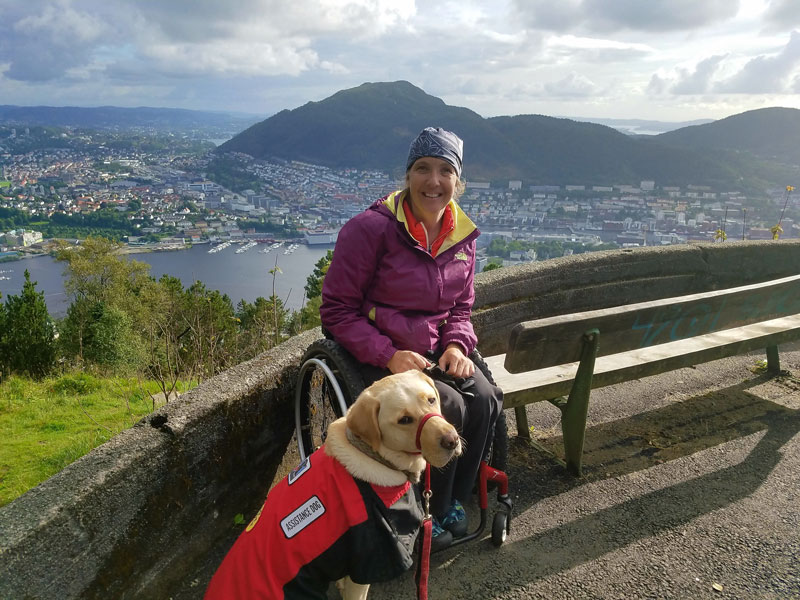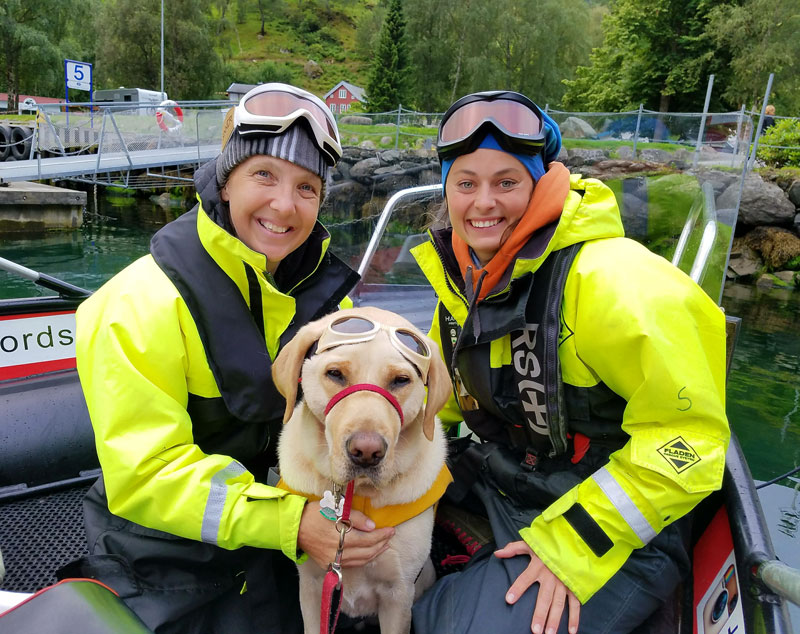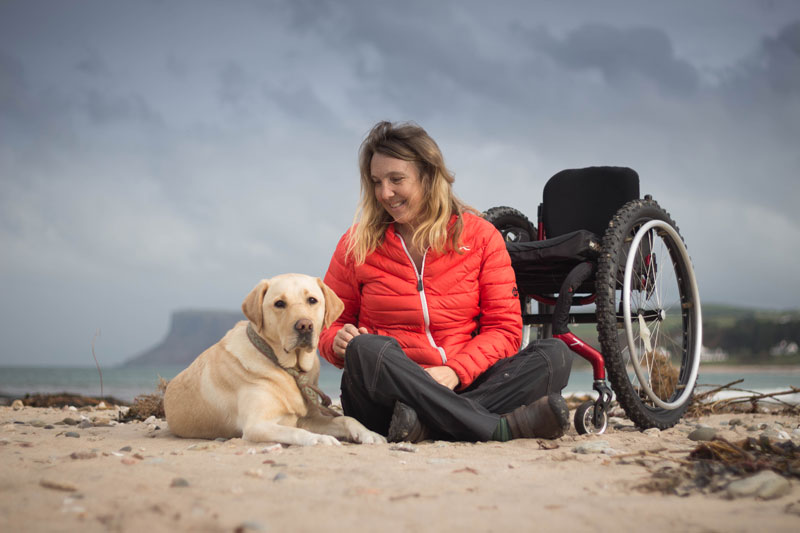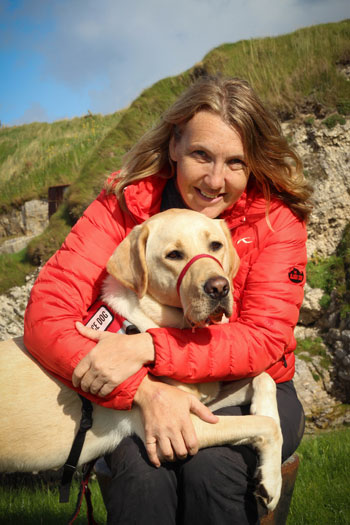I am writing this blog on a train from Cork City to Dublin, Ireland. I was scheduled to be on the train yesterday, but Hurricane Ophelia came crashing and blowing into Ireland, the worst hurricane to hit Ireland since 1961. After 24 hours of high force winds and 350,000 homes without power, I have emerged with a new appreciation for tea, a hearth in every room, and the Irish sense of humor & their willingness to plod through, making the best of everything. Irish pragmatism wins the day...every day.

Ireland is the home of my heart, a place I traveled extensively by foot for many years before my spinal cord injury. I would load my backpack with the things I would need for a month (or three!), with little regard for weight, and leave America with barely a plan. I felt both free and safe, even invincible perhaps. It didn't take long after landing to once again become my true self. Traveling independently offers a way of seeing the world and meeting people in a manner that cannot occur when one has the safety and familiarity of a travel companion. Plus, I was never one to like the negotiations required for traveling with others. Travel is so treasured by me that I have not come to the point of wanting to sacrifice my freedom and desires for another's. I guess I am a bit selfish in this, and I am okay with that. Independent travel has always been sacred to me.
Six months after my last "pre-injury" trip to Ireland, I was competing in USASA Nationals as an adaptive snowboarder. I was born with a genetic disorder called small patella syndrome (SPS). This disorder affects the way the bones and muscles are formed, as well as causing vision and kidney issues. While I could ambulate for much of my life, as I got older I was increasingly impacted by the progression of my disorder. I eventually began using forearm crutches and braces to get around. Despite these challenges, and they were real challenges most of the time, I was always active. I did my best to not have it impact how I lead my life, but pain can be a strong deterrent. I found that traveling to new environments, meeting new people, and overcoming challenges did not remove my pain, but it moved it further back in my consciousness. I think it was lessened by distraction, really. Novelty is exciting, learning is exciting, and being aware in unfamiliar surroundings is important. Distraction was always a useful pain management tool for me.
On April 2, 2007 I crashed hard during a slopestyle run and sustained an L1 spinal cord injury (SCI). But I was still determined to lead an active life. Nine weeks later I was handcycling the White Mountains, still in my "turtle shell," and learned to monoski nine months later. I loved it and pursued it as a career. Soon training for the 2014 Sochi Paralympics became my focus. I still had the desire to travel independently, as I always had, but fear held me back. How on earth was I going to carry my bags, negotiate buses, and get into buildings that were hundreds of years old? Would I be more vulnerable as a wheelchair user? Would my chair break, leaving me stranded with no place to get repairs? What was far more daunting were the emotional fears I had. Ireland and how easily and freely I traveled through it would surely be gone. My céilís dancing would not happen, and that alone was enough to break my heart. It took me 10 years to even listen to traditional Irish music again without feeling like I would drown in the sorrow of loss. Those are the things I most feared: that things would not be the same as they had been. For 10 years I pushed aside my desire to return to independent travel...because of fear.
After a second SCI forced me to retire and made daily life much more difficult, I applied for a service dog through NEADS: Dogs for Deaf and Disabled Americans. Five months later I was matched with an 80-pound yellow Labrador Retriever named Earle. Over the next six months we focused on strengthening our partnership and learning to work seamlessly together. After these six months, I started to feel a pull to return to Ireland. The feelings and fears that I had, fears of it all being logistically impossible and potentially filled with reminders of the loss of the freedom I once had, began to be replaced with the desire for adventure with my new partner, Earle. If he could make my life so much easier at home, then he could do the same in Ireland.

I wasn't quite ready to jump into the deep end yet. I decided to do a trial run with my sister Meghan as sherpa and general mobility aide. It took 24 hours in Dublin to realize that Earle and I could absolutely manage international travel on our own. Ingenuity, confidence, willingness to adapt, and Earle's skills would open the world for me. Upon my return home 10 days later, I set about to plan, in my typical minimalistic way, a "Year of Adventure" to celebrate 10 years of life with a SCI. Since that trip a year ago, Earle and I have traveled in the United States, Ireland, London, and Norway. Before our Year of Adventure is through, we will see Spain, Quebec, and one other country: maybe the Czech Republic or Hungary.
But travel for the sake of travel isn't enough for me; adding purpose is key. While we travel, Earle and I speak to schoolchildren & community organizations, and visit our elders at senior centers & nursing homes. We share our message about finding adventures, large and small, every day. We try to show that those with disabilities can live and travel independently with some ingenuity and flexibility of thinking, and we show that a service dog like Earle can provide much more than the basic skills of fetching and opening (literal) doors. Earle allows me to open the door to the world and has helped me rediscover who I am while redefining how I interact with my world.

I am not the same traveler I was 11 years ago, and while traveling around Ireland I found that this country, the home of my heart, is not the same either. My experiences are richer, more impactful. And because I have known the loss of independence, before regaining it through Earle, I feel even more free, independent, and capable of anything.
About the Author

Chris Slavin is an advocate, educator, writer, and speaker who travels the world with her mobility assistance dog, Earle. Together they look for adventures, large and small, every day. Chris is a believer in possibility and the ability of each individual to actualize change in themselves while encouraging others. Using travel and relationships, Chris shares her story while listening and learning from the life experiences of others. A traveler before sustaining a spinal cord injury as a competitive adaptive snowboarder, Chris pursued elite-level monoskiing for eight years before retiring from ski racing after a second spinal cord injury. A desire to return to independent travel after being partnered with Earle has led her to a sense of independence and freedom that she thought she had lost.
Chris's ride is a Quickie 7R.
Earle is a three-year-old yellow Labrador Retriever from NEADS: Dogs for Deaf and Disabled Americans. While being raised and trained in a prison, Earle was an avid student with a wise, yet easy-going attitude. After being matched with Chris in February of 2016, it quickly became apparent that Earle's skills and temperament were what Chris needed to reconnect with the world and her dreams of independent travel. This "Big World Dog" shows the world that a great attitude and a willingness to greet everyone as a long-lost friend goes a long way towards creating a rewarding and fulfilling life. Driven by the desire to test every possible swim location, and to sniff every smell, Earle finds the world an endless adventure.
Follow Earle's adventures on his Facebook page.
Most of the stories here on Live Quickie were submitted by readers. Do you have a story to tell? We'd love to hear it. Submit your story here.